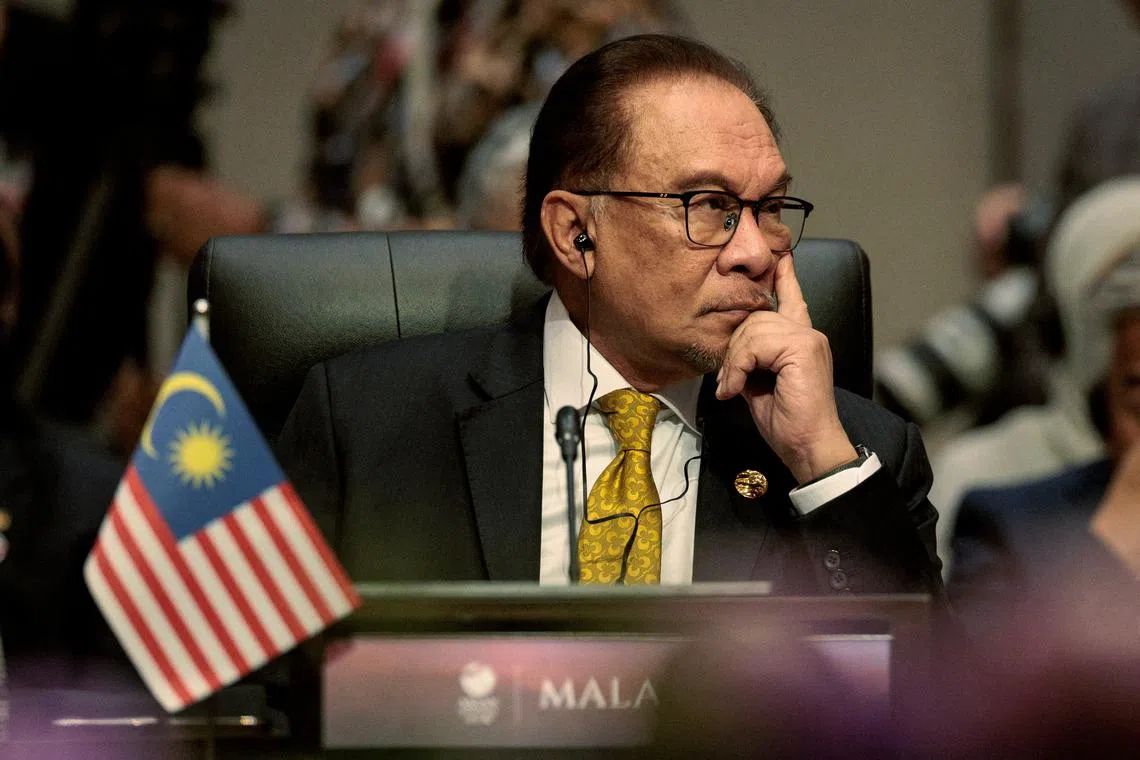Malaysian PM Anwar’s approval drops to 50 per cent amid economic concerns: Survey
Sign up now: Get insights on the biggest stories in Malaysia

The survey found that only 31 per cent of respondents think that the country under Mr Anwar Ibrahim is heading in the right direction,
PHOTO: REUTERS
KUALA LUMPUR – One year after coming to power, Prime Minister Anwar Ibrahim’s approval rating has fallen to 50 per cent, due largely to Malaysians’ unhappiness over the state of the economy
His approval stood at 68 per cent in December 2022, shortly after he took office in late November, said independent pollster Merdeka Center in a survey whose findings were released on Nov 22.
Nearly eight in 10 of the 1,220 survey respondents said the economy is the top issue facing Malaysians today, as it has affected livelihoods.
The approval rating of Mr Anwar’s government – consisting of his Pakatan Harapan (PH) coalition, former rival Barisan Nasional and several other smaller outfits – has also dropped, from 54 per cent in December 2022 to 41 per cent in the latest survey, which was carried out from Oct 4 to Oct 24.
“The dissatisfaction towards the federal government presently stands at 48 per cent,” Merdeka Center said.
It also found that only 31 per cent of the respondents think that the country is heading in the right direction, while 60 per cent believe it is going in the wrong direction due to economic issues, political instability and poor administration.
The survey reflects voters’ expectations that Mr Anwar’s government would “regenerate economic growth as well as address longstanding anxiety over inflation and tepid wage growth”.
Other issues that would shape public opinion in the future include “the form and substance of potential subsidies’ withdrawal, new taxation as well as revamp in the cash transfers programme”, said Merdeka Center.
Malaysia subsidises petrol, cooking oil and rice among other items, but higher commodity prices have driven the government’s subsidy expenses to record levels. The government also provides cash handouts to the bottom 40 per cent economic group.
Any changes to the subsidies or the cash handouts will become a cause of concern for the lower income group.
The survey found that economic concern is highest among Muslim bumiputera (84.1 per cent), followed by Indians (81.2 per cent), Malays (81.1 per cent), non-Muslim bumiputera (79.5 per cent) and Chinese (69.3 per cent). Bumiputera means “sons of the soil”.
Analyst Oh Ei Sun told The Straits Times that Mr Anwar faces difficulties in satisfying the majority of the Malays, seeing that the country’s largest ethnic group is based in rural areas that are opposition Parti Islam Se-Malaysia’s strongholds.
“For political mileage, he needs to focus on rural Malay areas, but it can be a futile effort as these are diehard PAS supporters. To create jobs there, he needs to build up businesses, which is a difficult proposition in rural areas,” said Dr Oh, principal adviser at the Pacific Research Centre of Malaysia.
He added that Mr Anwar should focus on retaining his traditional supporters among the urban Malays, non-Muslim bumiputera and non-Malays, by taking care of their economic well-being. Bumiputera include ethnic Malays and natives of Sarawak and Sabah who make up 69.9 per cent of Malaysia’s population of 32 million. Indians and Chinese account for 29.4 per cent.
The analyst added that Mr Anwar needs to grow the economy by attracting foreign direct investments and retaining local capital.
“This would require presenting the country as business-friendly instead of being an ideologically-driven nation, especially in terms of the government’s attitude.”
Mr Adib Zalkapli, client services director of strategic advisory firm BowerGroupAsia, said Mr Anwar’s drop in popularity would not affect his government’s stability, due to strong support from the MPs.
“The decline perhaps suggests that the honeymoon period is over, and the government needs to deliver throughout the second year of the administration,” he added.
In his trips overseas, Mr Anwar has been hard at work courting multinationals to invest in Malaysia.
At the recent Asia-Pacific Economic Cooperation CEO Summit in San Francisco, he met representatives from tech giants such as Google, Microsoft and TikTok, and voiced his hope on Facebook that the meetings would bear fruit.
With Malaysia’s next general election due by 2027, Mr Anwar’s government has about another year to show results to make sure that people are happy, Mr Adib noted.
“By 2025, we can expect campaigning to start, and it may be too late by then,” he said.



